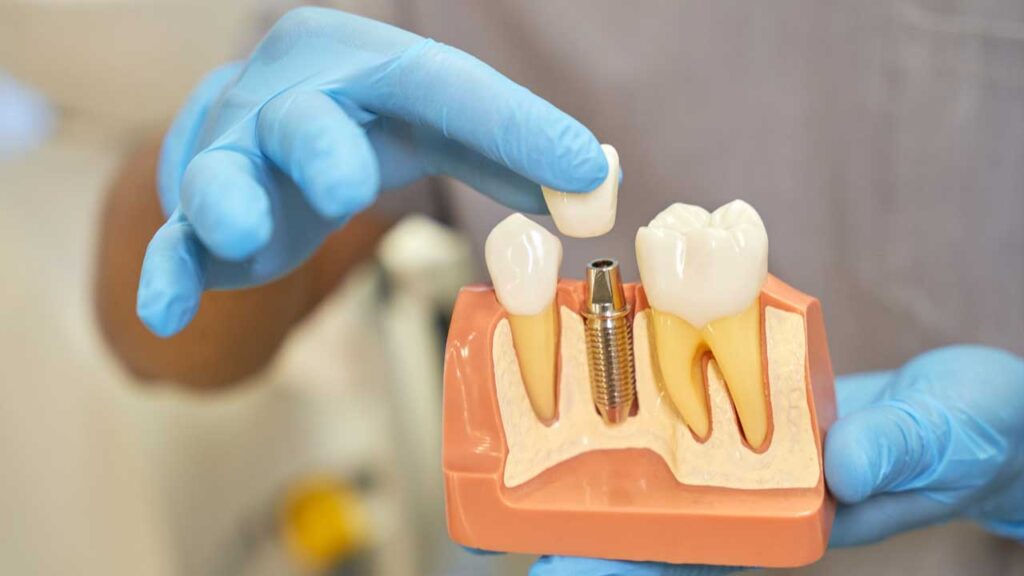Dental implants are a popular and effective solution for missing teeth. This blog will provide an overview of dental implants and cover important information that patients should know before considering this treatment option.

What are Dental Implants?
A. Definition:
Dental implants are artificial tooth roots that provide a permanent base for fixed or removable replacement teeth.
B. Types of Dental Implants:
There are several types of dental implants, including endosteal and subperiosteal implants. Endosteal implants are placed directly into the jawbone and are the most common type of implant. Subperiosteal implants are placed on top of the jawbone and are used when there is not enough jawbone to support an endosteal implant.
C. Procedure:
The dental implant procedure involves a surgical placement of the implant into the jawbone, followed by a healing period, and then a final restoration. The surgical placement of the implant is typically done under local anesthesia or IV sedation. Once the implant is in place, it will need to heal and fuse to the jawbone. This process, known as osseointegration, typically takes several months. Once the implant is fully integrated, the dentist will place the final restoration, which can be a crown, bridge, or denture.
Benefits of Dental Implants
A. Natural Looking:
Dental implants look and feel like natural teeth. They are custom-made to match the color and shape of your existing teeth, making them virtually indistinguishable from your natural teeth.
B. Durable:
Dental implants are a long-term solution for missing teeth, with a success rate of over 95%. They are made from biocompatible materials that are designed to last for many years with proper care and maintenance.
C. Improves Oral Health:
Dental implants can help to preserve the jawbone and improve overall oral health. When a tooth is missing, the jawbone begins to shrink, which can lead to changes in the shape of the face and the loss of other teeth. Dental implants help to stimulate the jawbone and prevent it from shrinking. Additionally, they help to maintain the natural bite and prevent shifting of the remaining teeth.
Risks and Complications
A. Surgery:
Dental implant surgery is a minor procedure, but there are risks and potential complications that should be considered. These include infection, nerve damage, and implant failure.
B. Implant Failure:
In rare cases, dental implants can fail due to infection, nerve damage or other complications. This can occur if the implant is not placed correctly, or if the patient does not follow proper care and maintenance instructions.
C. Cost:
Dental implants can be costly, but many insurance plans cover some or all of the cost. Additionally, some dental offices offer financing options to help make the procedure more affordable.
healthcareDental health is an important aspect of overall health and well-being. Take control of your dental health with our top-quality dental health care products. Say goodbye to painful and inconvenient dental issues and hello to a brighter, healthier smile.
These products are designed with the latest technology and are made from premium materials, ensuring that you get the best results. Whether you’re looking for a solution for sensitive teeth, gum health, or just want to keep your smile sparkling, our dental health care products have got you covered.
Tired of hiding your smile due to yellowing, stained, or sensitive teeth?
ProDentim is here to help. This advanced formula whitens and strengthens your teeth, while also reducing sensitivity and promoting oral health. Say goodbye to expensive and painful dental treatments, and start enjoying a bright, confident smile with ProDentim.
Click Here to Try ProDentim now and see the results for yourself!
Struggling with tooth sensitivity, gum problems or bad breath?
Dentitox Pro is the solution you need. This natural, effective formula helps to clean and strengthen your teeth and gums, giving you a brighter, healthier smile. Dentitox Pro is made with the finest ingredients and is free from harmful chemicals, making it safe and gentle for everyday use. Say goodbye to pain and embarrassment, and start enjoying a confident, beautiful smile with Dentitox Pro.
Click Here to Order now and get 20% off your first purchase!
Click Here for Professional Teeth Whitening
Frequently Asked Questions:
A. Are dental implants suitable for everyone?
Dental implants are suitable for most people, but a consultation with a dentist is needed to determine if you are a good candidate. Factors that can affect the success of the procedure include overall health, the condition of the jawbone, and the number of missing teeth.
B. How long do dental implants last?
Dental implants can last for many years with proper care and maintenance. However, the lifespan of an implant can vary depending on the individual case. It is important to have regular check-ups with your dentist to ensure that the implant is functioning properly and to address any issues that may arise.
C. Can I eat and speak normally with dental implants?
Yes, once the implant has fully healed and the final restoration has been placed, patients should be able to eat and speak normally. Dental implants are designed to look and feel like natural teeth, so patients should not experience any difficulty with eating or speaking.
Dental implants are a popular and effective solution for missing teeth. They provide a permanent base for fixed or removable replacement teeth, and offer a range of benefits, including natural looking, durable and improving oral health.
While there are risks and potential complications, with proper care and maintenance, dental implants can last for many years. It is important to consult with a dentist to determine if dental implants are a suitable option for you.

1 thought on “Dental Implants: What You Need to Know”